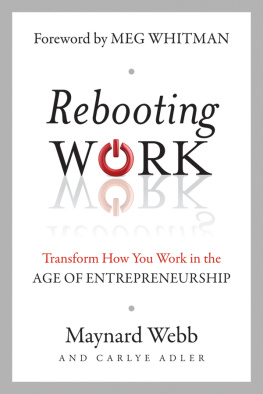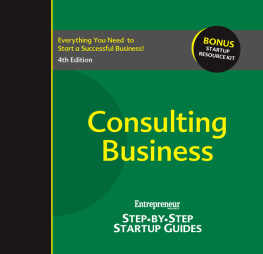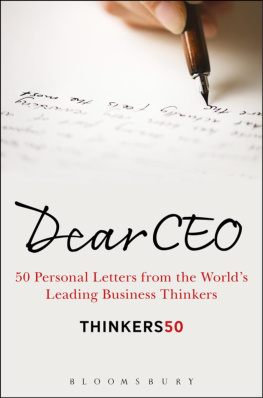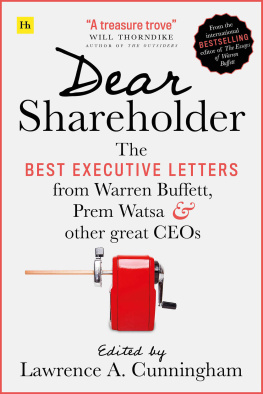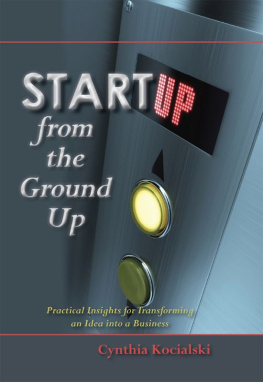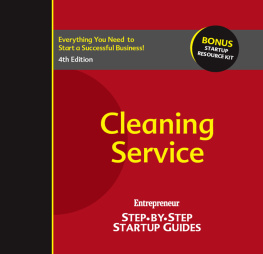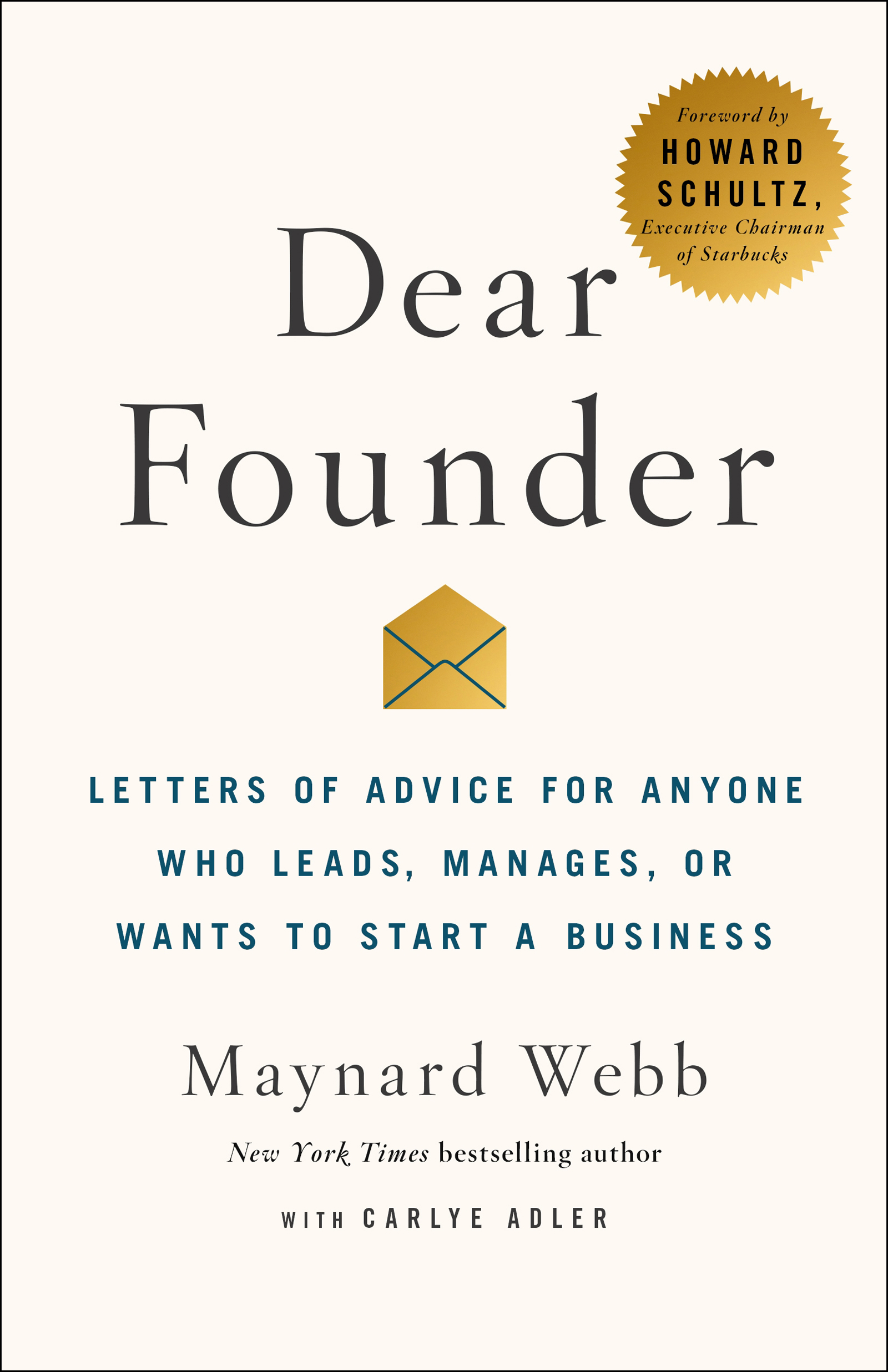Contents
Guide
Pagebreaks of the print version

The author and publisher have provided this e-book to you for your personal use only. You may not make this e-book publicly available in any way. Copyright infringement is against the law. If you believe the copy of this e-book you are reading infringes on the authors copyright, please notify the publisher at: us.macmillanusa.com/piracy.
We originally wrote these lettersand this bookas a gift for our founders. Were inspired every day by the opportunity we have to help make founders more successful and to help great new technologies reach the world. We also know that creating a vibrant company is incredibly hard to do. This book is for those who have the courage to do it.
I wish I had this book on my desk for the past forty years.
Thankfully, Maynard Webb has been my friend and counsel for the last twenty.
We met when I was a member of eBays board of directors, from 1998 to 2001. This was also a unique period in American business. The mid- to late-nineties were exciting times to be an entrepreneur. Everyone, it seemed, had a brilliant business idea and billions of investor dollars flowed into countless startups.
Unfortunately, the indiscriminate influx of capital masked the true difficulty of starting a company. Because it was easy to throw money at problems, the period also was one of hubris, when many founders and business leaders became overconfident in their abilities to build great, enduring companies.
When the internet bubble burst, the day-to-day realities of running a business, especially a startup, could no longer be covered up or ignored. Leaders were suddenly forced to make tough choices and wade through complex challenges, such as how to raise money in a down market, how to spend the funds they had wisely, how to scale without sacrificing core values, how to inspire deflated employees, as well as how to deal with poor performers, new competitors, crisis, and failure.
Today, we can learn a lot from that era.
For one, leadership is always easier when the wind is at your back, but much harder in the headwinds. Thats why humility is so vital for founders, entrepreneurs, and even seasoned CEOs. None of us have all of the answers all of the time. We must have the confidence to acknowledge this, and to consistently seek out and consider wise counsel.
I should clarify that I am not the original founder of Starbucks. I bought the company with investors when it had six stores in Seattle in 1987. But now that the company has grown into a global business, I still consider myself an entrepreneur, always in pursuit of innovative ways to bring people together and improve the quality of life for those in communities around the world. This passion is one many entrepreneurs share, and is especially relevant today.
All of us find ourselves in another era of exciting, unprecedented change that demands thoughtful attention and fresh approaches to problems in all corners of society, from healthcare and education to transportation and communication.
Answers and creative ideas will come not only from bold government leaders, but those in the private and nonprofit sectors. For the best new products and services to take hold, they must be guided to market by people who possess enough humility to know what they do not know so they may build sustainable, values-based organizations that continue to raise capital, attract talent, meet high performance standards, and grow.
This is why Dear Founder is so timely and valuable. Your ideas and your organization may indeed be original, but many of the management, operational, financial, and personal leadership questions you have today are not new. Generations of smart people have tackled the same or similar issues, and these recurring quandaries are addressed with candor in the pages that follow.
The author, my friend Maynard, has at one point navigated these problems himself or helped countless others do so, including me. He remains one of the wisest leaders I know, with an intelligence that approaches business and entrepreneurship through a rare mix of strategy and humanity. I have learned much from him over the years, and am so pleased he has written this book to share his experience and wisdom.
Maynard also understands that entrepreneurs take their work especially personally. Because we have a heightened need to solve problems quickly, he has organized his advice by the questions we inevitably ask in the day-to-day struggles of leadership and growing a business. In this way, Dear Founder is as effective and efficient as calling the smartest person you know for advice the moment you need it.
He and I want you to succeed. More than ever, the world needs innovative, honest, empathetic, capable leaders to bring compelling ideas, products, and services to fruition. Doing so does not require a business degree, but it does demand humility, and the impetus to seek out and listen to wise counsel, at every stage of the journey.
So let this book be your mentor and role model, coach and counselor, confidant and friend. Come to it with your questions and your fears, as well as an open mind. Do so, and I believe that you will be one step closer to achieving your own dreams.
Onward,
Howard Schultz,
former Executive Chairman and Chief Executive Officer
of the Starbucks Coffee Company
About two years ago my son, Kevin, recommended that I read a blog post on the website Medium about a son whose father left him a box of letters. The father was terminally illthough the son never knew that until he passed awayand the letters were filled with advice on how to navigate the various rites of passage the boy would face throughout his lifetime. Its a poignant and powerful piece. It also turns out that it was fiction.
Still, Kevin urged me to write my own lettersmissives of advice to the founders of our portfolio companies to help guide them as they faced issues throughout the life cycles of their companies. He thought I could help them with the gnarly everyday problems of running a business: when they got in a fight with their co-founder, or when their board was driving them crazy, or when they were afraid their idea wasnt working.
It was a good suggestion. I was routinely offering this kind of advice to the more than eighty-five founders in our investment portfolio at the Webb Investment Network (WIN) and it was hard to find the time to have so many 1:1s. Because so many of our founders faced the same issuesand because they had nowhere else to turnit made sense to try to codify the advice so we could share it more broadly than in an individual meetings. I got to work on a project we called Letters to a Founder.
Our original intent was to write letters to offer guidance and coaching for our founders in the moments that mattered most. I wrote each letter with a specific founder and situation in mind, but since so many of our founders face similar challenges I discovered that the advice and anecdotes were usually relevant for other founders, too. I began to send out letters and requests for new letters poured in.
There were so many topics to cover. What do you do when you miss your quarter? How do you focus on whats most important? What do you do when a key hire leaves? When a topic was outside my area of expertise, we looked to the directors at WIN to contribute advice. But we didnt stop there. The most special part of WIN is that it is a network of affiliatesmore than eighty amazing individuals, most of whom Ive worked with extensively in the pastwho now co-invest alongside me, offering money and also advice to startups. These people have started companies that have gone public, run entire departments at fast-growing companies, and have decades of management and industry experience. We asked these affiliates to contribute letters in their areas of expertise and they wrote invaluable pieces covering situations such as what to do when your startup gets sued, when to structure sales commissions, and how to deal with a competitor that enters your space, among others.


